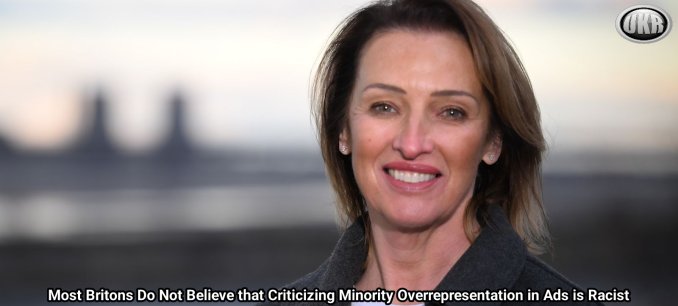
Making sense of the Sarah Pochin affair
ERIC KAUFMANN
This week, British Reform Party MP Sarah Pochin agreed with a caller on a prominent phone-in show, opining that ‘It drives me mad when I see adverts full of black people, full of Asian people. It doesn’t reflect our society and I feel that your average white person, average white family, is not represented any more.’
At this, Pochin received a chorus of condemnations from the left of the political spectrum. Labour health secretary Wes Streeting called her remarks ‘a disgrace,’ adding that ‘I think it was racist and the deafening silence from her party leader [Nigel Farage] says it all.’ Liberal Democrat leader Ed Davey called it ‘racism, pure and simple.’ David Lammy decried her remarks as ‘mean, nasty and racist.’ Prime Minister Keir Starmer called it ‘shocking racism.’ All called for the Tories to condemn her and for Reform to sack her.
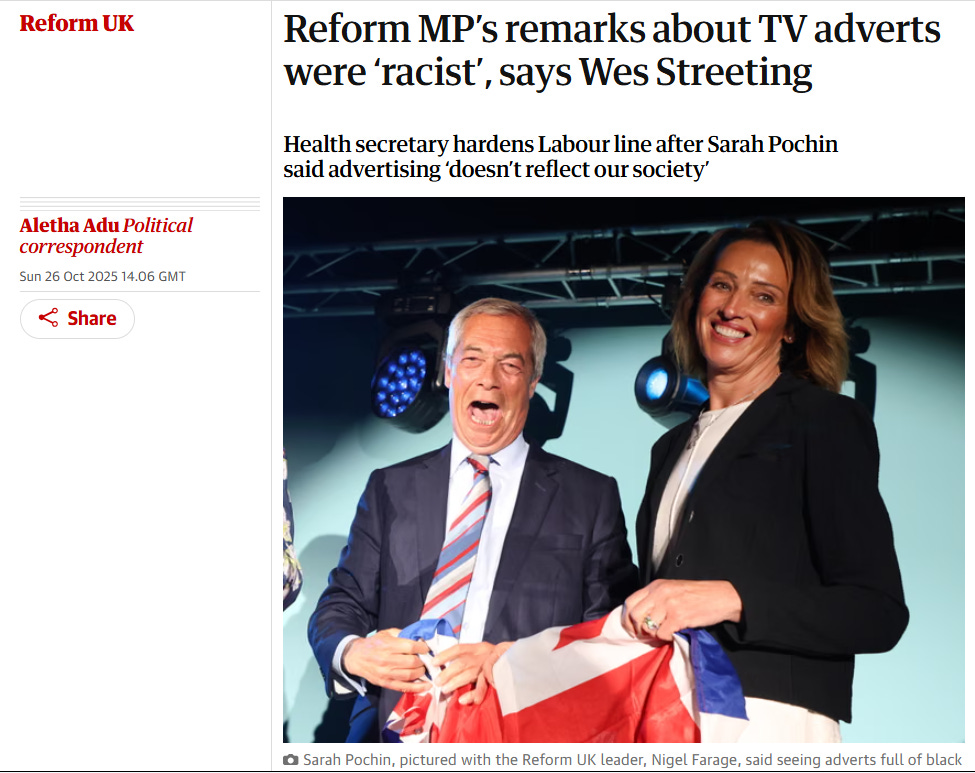
Importantly, Tory politicians avoided criticizing Pochin as racist. Shadow Home Secretary Chris Philp was grilled by Laura Kuenssberg of the BBC, initially deflecting her question about whether Pochin’s remarks were racist by saying the public need to be able to discuss immigration. However, on Times Radio, he later qualified his remarks by saying, “She should not have said that in the way she said it, that was completely wrong and yes it was racist.”

Pochin also later apologized for her phrasing, averring that her comments were directed at woke advertisers who had gone ‘DEI mad.’ She was supported by party chairman Zia Yusuf, who argued that the misrepresentation of the British population’s racial makeup was a legitimate point for debate. Indeed, the context for her discussion on the Talk TV call-in show was a Channel 4 study which showed that black people, who form just 4 percent of the UK population, featured in 37% of ads in 2020, rising to 51% in 2022.
Pochin later went on the offensive on social media, questioning Labour’s double-standards. As Laurie Wastell observed in the Spectator, When Pochin asked Streeting for his thoughts on Scottish Labour leader Anas Sarwar decrying the fact that 93 percent of Scottish officials were white, Wastell commented that ‘[Streeting] simpered that Sarwar’s identitarian rant was a “powerful point about a lack of representative leadership in Scotland”. As everyone knows, the “diversity” game the left loves to play is unashamedly two-tier: calling for fewer whites, good; calling for more whites, bad.’
The Study
Where are the British public on these vexed questions? To find out, I ran a quick survey on Prolific, a platform used mainly by academics, with a sample balanced between left and right, and between the sexes. These samples still skew toward the better educated and tech savvy, but they give a decent indication of where public sentiment lies.
The sample of 300 was randomly shown one of four statements (I have added highlighting here):
1. If someone says they are upset because black people are overrepresented in advertisements,
2. If someone says they are upset because white people are overrepresented in advertisements,
3. If someone says they are upset because black people are underrepresented in advertisements,
4. If someone says they are upset because white people are underrepresented in advertisements,
They were then asked, ‘Is this a) racist, b) not racist, c) unsure. Response categories were rotated to prevent bias toward the first available answer.
The first point to make is that in this sample, 45 percent of Britons say it is racist to be upset at the overrepresentation of black people in advertisements, with 40 percent saying this is not racist and a further 15 percent unsure. On this phrasing, the public is evenly divided.
However, when the question is phrased as whites being underrepresented, only 29 percent of people say such a comment is racist. Not only that, but a higher share of the public find Anas Sarwar/Hamza Yousaf-style comments on the overrepresentation of whites racist (32%) than people saying whites are underrepresented in ads (29%). Finally, virtually no one believes that pointing to the underrepresentation of black people in ads is racist (3%).
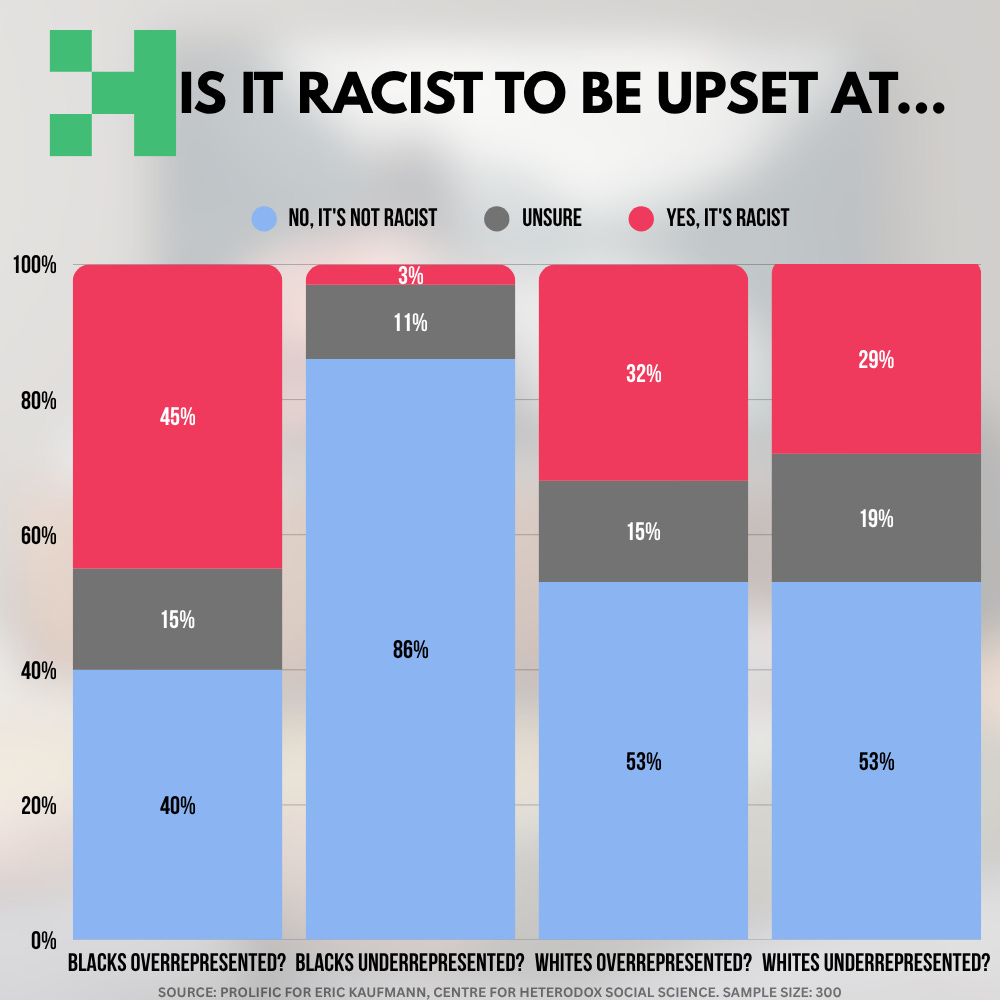
Opinion obviously divides on political lines on these questions. The relatively small sample makes it important to amalgamate responses, so the next chart shows results by vote intention for whether people think that being upset at blacks being overrepresented or whites being underrepresented in ads is racist. (Sample size per bar ranges from 18 to 25 apart from SNP/Plaid Cymru at 4.)
Combining the blacks overrepresented/whites underrepresented responses, I find that among left-of-centre parties a slight majority of people believe these sentiments are racist. For Labour and Liberal Democrat voters, it is merely 45-50 percent. Only Green voters are solidly of the belief that both remarks combined are racist. While all voters for Plaid Cymru and the SNP believe these positions are racist, bear in mind that just 4 respondents in the sample voted for these parties, so this could well be a blip.
Finally, those who do not intend to vote, or say they would vote for a minor party, lean toward the Reform position. Here it is worth saying that 8 in 10 of this group are nonvoters, who split evenly along ideological lines. The disengaged public is very much of the view that Pochin-style comments are not racist.
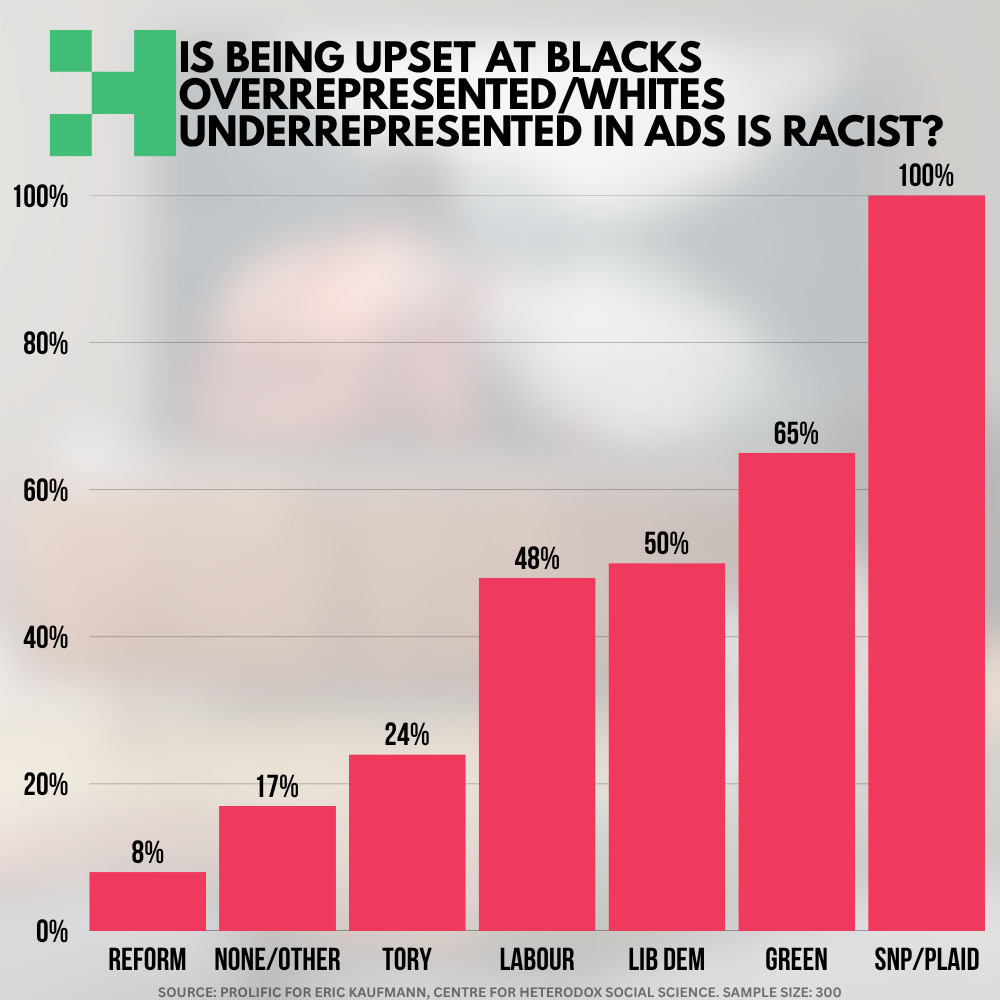
If we zero in on the question of whether a person who is upset at black overrepresention in advertisements is racist, grouping voters by self-identified political ideology, we find a 61-point gulf between left (81% racist) and right (20% racist), with centrists and nonvoters similar to the right, albeit with a larger share unsure. Sample size is 14-25 per ideology.
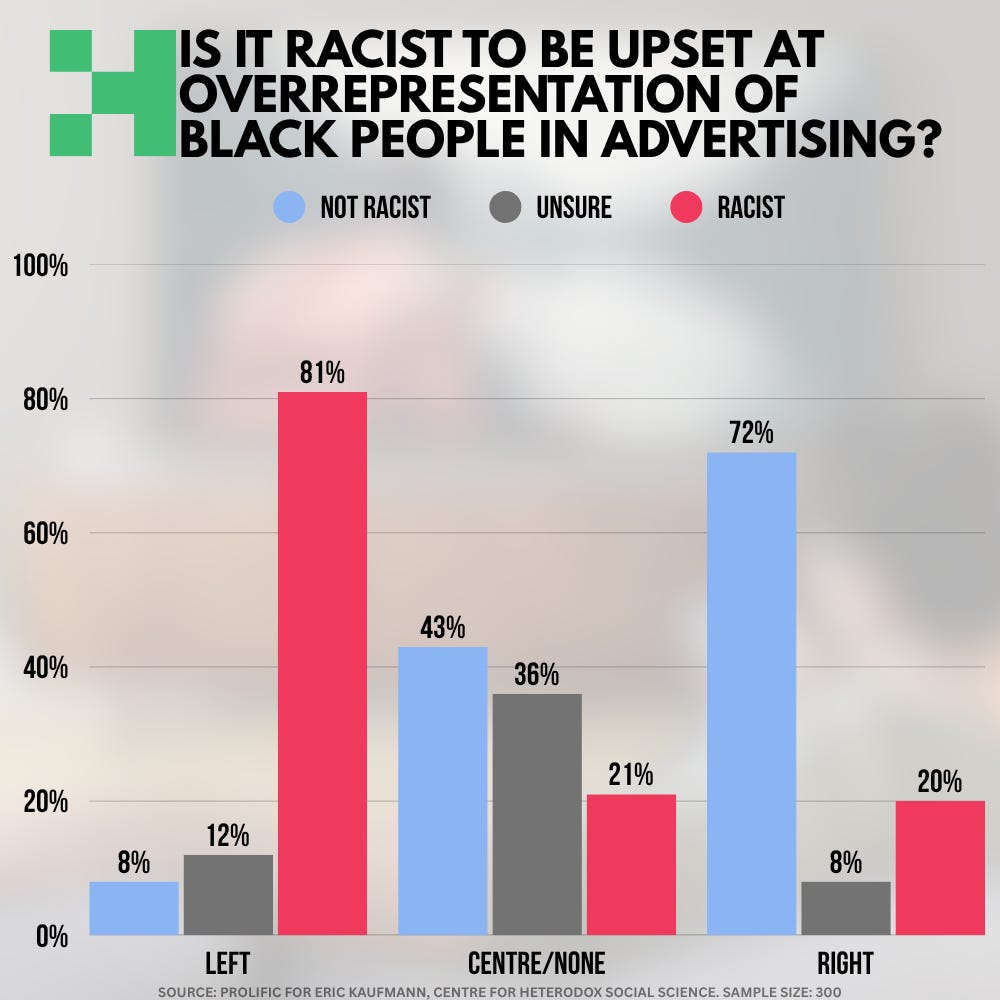
However, now consider how the results change when we alter ‘blacks overrepresented’ to ‘whites underrepresented’, which is effectively just the flipside of the same statement. While left-wing voters are still more exercised, the share calling this racist tumbles from 81 to 48 percent, and the partisan gap narrows.
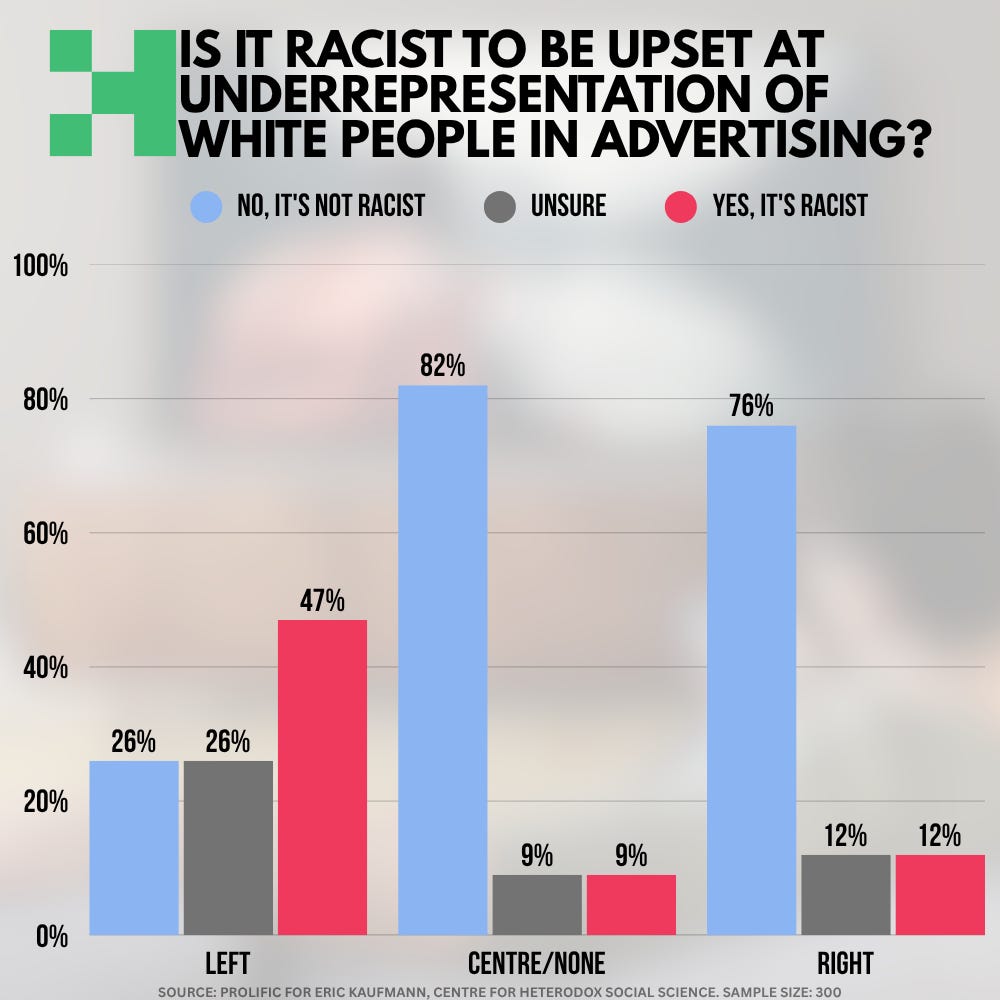
When asked the Sarwar/Yousaf question about whether it is racist to be upset at white people being overrepresented, an important share of left party voters (33%) agree, which is similar to the proportion on the right. A 56 percent majority of nonvoters and other party voters say this is racist, though with a sample of 12 this reflects random noise in the draw from this population: a statistical analysis controlling for demographics shows no significant effect for none/other voters on this question.
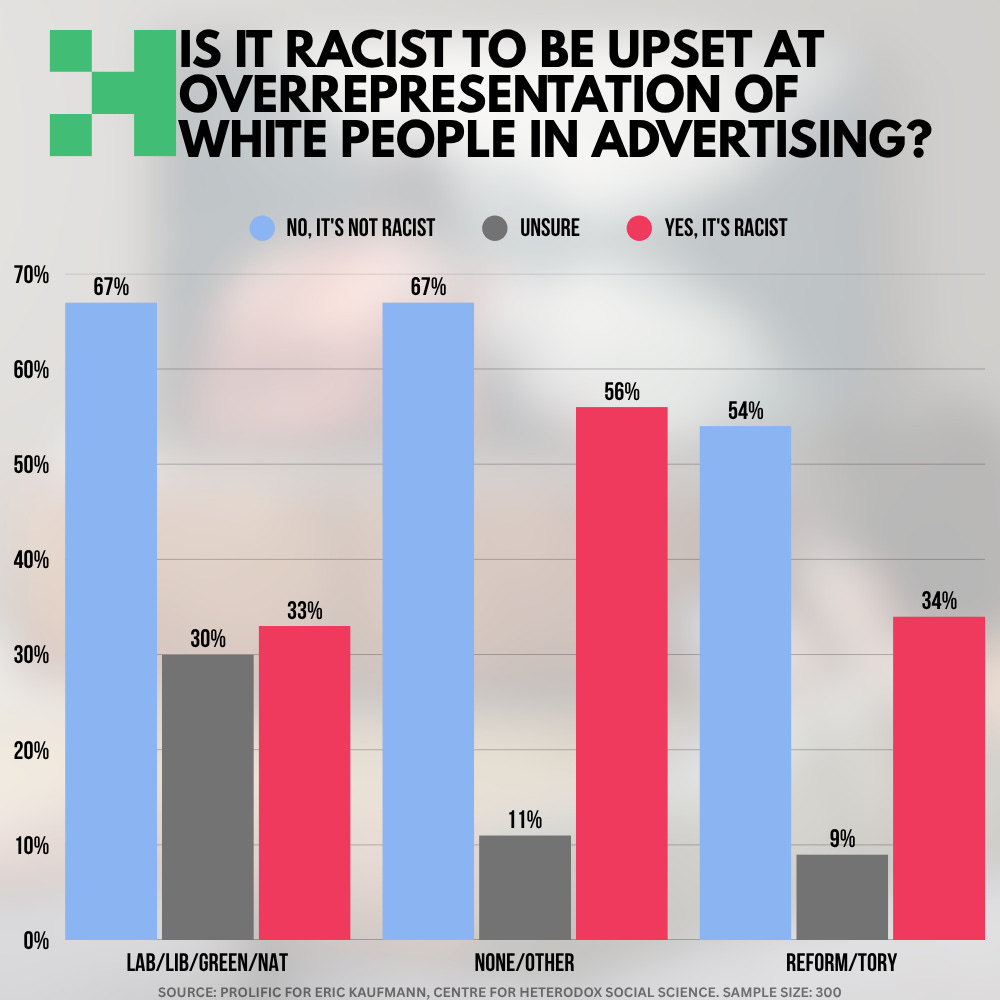
Bottom line: more people think that being upset about too many white people in ads is racist than think a complaint about too few whites is racist, and there is no partisan divide on this question.
The spread of responses across the four versions of the question by party family appears in the figure below. The results show two things. First, that left voters are much more exercised by people being upset about black overrepresentation and white underrepresentation than right voters and nonvoters. Second, that all voters are more likely to think that worrying about a group being overrepresented in ads is racist than worrying about a group being underrepresented. Finally, that left and right voters have similar views on the Sarwar/Yousaf stance of calling out the overrepresentation of whites – with 1 in 3 left-wing voters calling this racist.
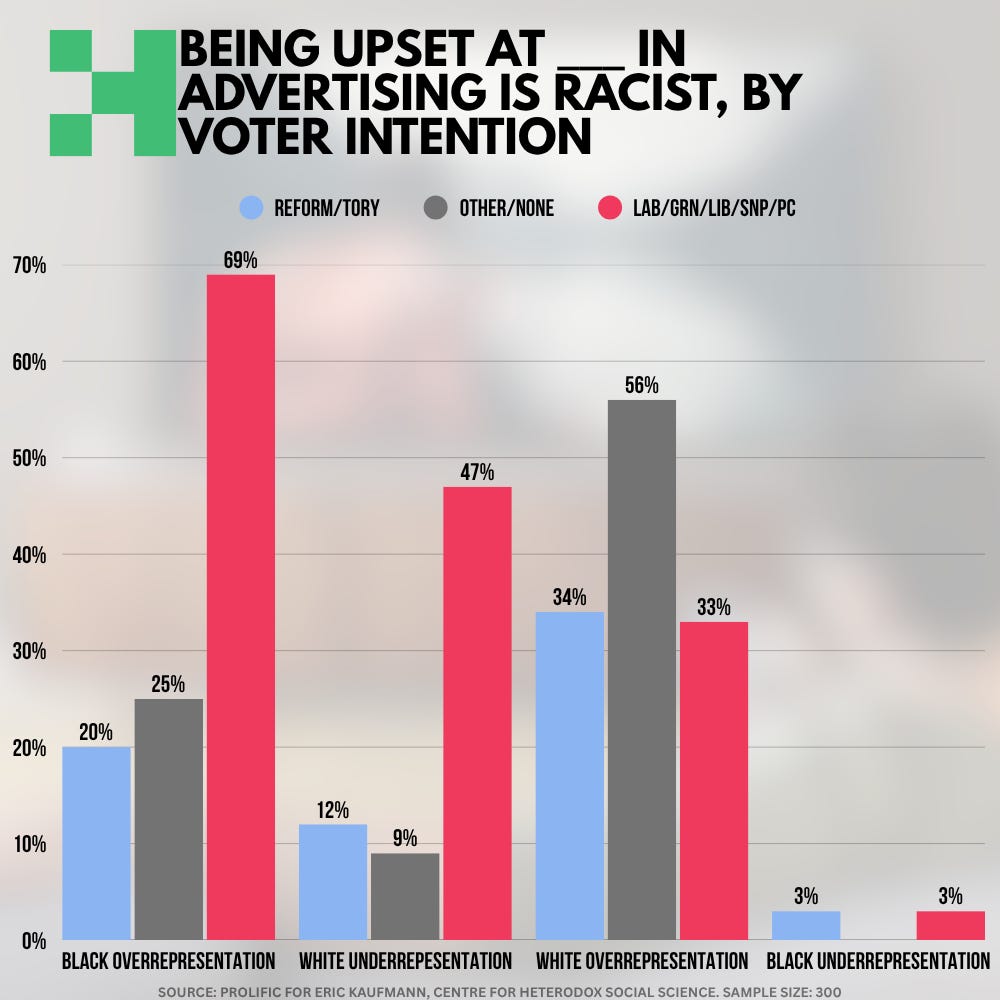
Sarah Pochin’s comments caused a firestorm in the media, with the political left lining up to condemn her remarks as racist. These results suggest that she would have been better to phrase her remarks in a more temperate way, focusing on the underrepresentation of whites rather than the overrepresentation of ‘black and brown people’. Moreover, the fact that South Asians are not overrepresented the same way black people weakens her argument and makes her look anti-minority.
Yet, in practical terms, white underrepresentation and black overrepresentation are two sides of the same coin. In view of this, the fact that 81 percent of left voters believe it is racist to be upset about black overrepresentation while just 48 percent of them say the same about white underrepresentation is striking. Conservatives and centrists are similarly inconsistent, though more modestly.
Nevertheless, in another sense, public inconsistency is understandable: dislike of outgroups is actually a separate disposition from attachment to in-group. The former is racist, the latter is not, and this is an important distinction to draw. Pochin’s remarks could be read as being motivated by animus toward ‘black and brown people.’
On the other hand, we need to balance this with the principle of charity that her meaning, in the context of the wider conversation and her prior commentary, was to point out that the white majority is being underrepresented in advertising. This is a much more acceptable sentiment – only 29 percent of people in the survey think this is racist – and Pochin should have phrased her views this way.
Likewise, Anas Sarwar and Hamza Yousaf erred in focusing on white overrepresentation, a position which even a third of left-wing voters find racist, rather than black (or brown) under-representation, which almost nobody finds racist. In practical terms the two are the same, but the way they play on public sensibilities differs substantially.
In view of the fact that focusing on a group being overrepresented has the whiff of outgroup antipathy rather than in-group attachment, the public’s sensibility in both the Pochin and Sarwar/Yousaf cases is understandable. On this reading, Sarwar and Pochin are guilty of negligence, not criminality.
A further wrinkle in the data is blatant partisan inconsistency, especially on the left. 81 percent of left voters think a person being upset about black overrepresentation is racist, but just 33 percent say the same about someone being upset about white overrepresentation: a 48-point gap. For right voters, there is a 14-point gap the other way, with 20 percent calling Pochin-style sentiment racist as against 34 percent viewing Sarwar/Yousaf-type comments as racist.
Those on the left might justify their inconsistency on the basis of the critical race theory position that racism is ‘prejudice plus power’ and that nonwhites do not have power. Or they could claim that the history of white prejudice justifies their stance. But the implication of this analytically dubious set of propositions is that minorities cannot be racist while past wrongs justify present discrimination, views rejected by most Britons.
This episode has important implications for the cultural progressive beliefs which form the established moral-emotional regime in the high culture and elite institutions of western societies. As I wrote in my book Taboo (The Third Awokening in North America), race is the most sacred category in the woke trinity of race-sexuality-gender, hence those on the intellectual left have much greater difficulty consistently applying the principle of anti-racism than conservatives or centrists – who are less invested in this quasi-religious belief system.
The debate reveals the blind spots of left and right. Western societies were built for whites and thus whites are ‘normal’ in everyday life, which can confer modest advantages that the right tends to overlook. Some sensitivity around language describing minorities is justified, which Pochin failed to observe.
The left, which dominates the meaning-making institutions, is, likewise, unable to understand that whites are disadvantaged demographically – they are shrinking not growing, which induces malaise and anxiety. When it comes to identity recognition, they are not permitted to express their group interests or organize around them the way minorities are, giving way to frustration. Hence Sarwar-style accusations directed against whites come across as inflammatory.
Wes Streeting’s response to Pochin over Anas Sarwar’s comments – that Sarwar was pursuing social justice and thus Sarwar and Pochin’s remarks are incomparable, shows the myside bias that blinds most progressives and liberals, for whom ‘punching up not down’ is an obvious moral centre which should trump all other considerations.
The final aspect of the Pochin story is that forms part of a wider cultural struggle over the boundaries and power of progressive taboos in society. In Canada, for instance, criticizing immigration carried a stigma for decades until last year, but in Britain the taboo on discussing immigration and multiculturalism had already lost some force, becoming more contested and less radioactive in recent years.
Stigmas are black-and-white social punishments, not proportionate penalties linked to the severity and repeated nature of an offence. Danish anthropologist Agner Fog argues that culture wars in society take place whereby the proponents of taboos try to expand them through ‘regalization’ while the accused resist mission creep by trying to roll back the scope of taboos through what he calls ‘kalyptization’. Gays and youth subcultures are among those who successfully overturned prior stigmas.
This cultural battle is not adjudicated through jurisprudence and reason, but through emotion-laden accusations, declarations and punishments. If regalizers succeed in punishing and initiating cascades of mass opprobrium, the taboo expands. If they fail, it recedes.
The Pochin affair has resulted in a stalemate along partisan lines, weakening the societal consensus required to enforce taboos across the board. Reform and Tory politicians have refrained from calling Pochin a racist, with Zia Yusuf defending her as having a legitimate point – albeit phrased insensitively. Nigel Farage said the remarks were ‘ugly’ but that Pochin in fact was trying to talk about the legitimate issue of white underrepresentation in advertising, and will not be disciplined.
While the Tory Chris Philp ultimately did admit her remarks were racist, upholding taboo boundaries, the fact he resisted this on the BBC so strenuously represents a setback for progressive taboo-strengthening regalization – and movement in the direction of taboo-weakening kalyptization. The writ of progressive taboos no longer binds the right half of the political spectrum, though this would undoubtedly be different had Pochin expressed blatant racism.
These things seem trivial, yet they are central for the durability of the ‘vibe shift’, a newly unfolding post-progressive tendency in the high culture which is beginning to erode the sway of the most intrusive forms of post-1960s progressive public morality.
This article (Most Britons Do Not Believe that Criticizing Minority Overrepresentation in Ads is Racist) was created and published by Eric Kaufmann and is republished here under “Fair Use”
See Related Article Below
If Reform MP Sarah is racist, so is David Lammy
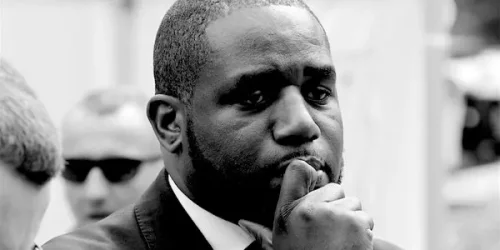
STEVE DOUGHTY
THE Reform MP Sarah Pochin is rapidly developing a reputation for speaking first and engaging brain later.
Her first Commons intervention, about banning the burqa, was badly planned and timed and turned into a bomb that probably did more damage to the thrower than the target. At the weekend she attacked the subject of TV advertising.
She said on TalkTV that ‘it drives me mad when I see adverts full of black people, full of Asian people’, adding that ‘it doesn’t reflect our society’ and ‘your average white person, average white family’ is not represented any more.
It is all the fault of ‘woke liberati’ in the ‘arty-farty world’. Mrs Pochin went on to observe that ‘it might be fine inside the M25, but it’s definitely not representative of the rest of the country’.
This is all routine talk around the country. According to an analysis published by Channel 4, more than half of all TV commercials feature black actors, while the 2021 census reported that 4 per cent of the population of England and Wales is black. But if a Reform MP says it, you can expect a pile-in.
Spearheading the assault, taking time off from sorting out the prisons following the Epping asylum seeker fiasco, was Justice Secretary and Deputy Prime Minister David Lammy.
An angry Lammy said: ‘Her statements were mean, were nasty and were racist. Our country is so much better than this. Unbelievably nasty statements.
‘All of us are neighbours in this country. All of us recognise the contribution of the Windrush generation. Black Britons particularly in so many areas of our life. These were terribly racist remarks. Nigel Farage should sack her effectively and certainly say something and apologise for what she has said today,
‘I am disgusted by what she said. Not just on behalf of myself or my family or the people of London but on behalf of our country. We are so much better than this.’
Mr Lammy has long held strong views on the impact of TV advertising. He was Shadow Justice Secretary in 2021 when he spoke to the advertising industry journal Campaign.
He said: ‘When I can spare a moment to watch TV with my wife and kids, it does surprise me the differences in the people that I see on the screen compared with when I was younger. From TV shows to adverts, I grew up thinking the nuclear family was white and middle class. I didn’t fit into that and the older I got, the more I realised that neither did a significant number of people in this country.’
Mr Lammy observed that ‘diversity is central to advertising’. He said that ‘narratives and stereotypes that we have of certain groups’ have undergone drastic changes and ‘many people underestimate the power of the creative sector in playing a large part in that’.
London advertisers, he said, forget people outside London. ‘I think it’s clear that almost all advertising and media industries are guilty of this, as are almost all industries. I think it would be naive to think that communities across Britain haven’t been overlooked.’
Examining these remarks, it seems that Mrs Pochin and Mr Lammy are in agreement, except on one thing. She thinks there are too many black faces, and he thinks there were too many white faces. I would suggest that if Mrs Pochin is racist, so is Mr Lammy.
Mr Lammy has long form in smearing other people as racist. If it’s Tuesday, he’s going to call someone a racist.
My favourite Lammy smear was in 2013. During the election of a new pope, he objected to the BBC speculating about whether the smoke from the Vatican chimney would be black or white. ‘This tweet from the BBC is crass and unnecessary,’ he wrote. ‘Do we really need silly innuendo about the race of the next pope?’
Lammy’s ignorance – white smoke means a new pope has been chosen while black means the process is still going on – was all the more surprising because one of his early political roles was a seat on the Church of England’s cabinet, the Archbishops’ Council. You would have thought he might have picked up something about Christian traditions.
Following her TalkTV performance, Mrs Pochin backed down and apologised. I would have preferred it if she had stuck it out. It never looks good when a politician runs from the sound of gunfire. But perhaps Nigel Farage stepped on her.
That would be the Nigel Farage recently falsely accused by David Lammy of having ‘once flirted with Hitler Youth when he was younger’.
Whatever his other flaws, I think David Lammy is a steaming hypocrite. He could make himself look less mean, nasty and racist if he took a brief break from smearing political opponents and got on with doing his own job.
Meanwhile, if anybody doesn’t like TV advertising, there is a straightforward solution. If you don’t like the ad, don’t buy the product. I wouldn’t fly with Virgin Atlantic because I don’t like the way it uses identity politics to sell itself. If enough people do the same, the advertising will change. It’s called the market.
This article (If Reform MP Sarah is racist, so is David Lammy) was created and published by Conservative Woman and is republished here under “Fair Use” with attribution to the author Steve Doughty

••••
The Liberty Beacon Project is now expanding at a near exponential rate, and for this we are grateful and excited! But we must also be practical. For 7 years we have not asked for any donations, and have built this project with our own funds as we grew. We are now experiencing ever increasing growing pains due to the large number of websites and projects we represent. So we have just installed donation buttons on our websites and ask that you consider this when you visit them. Nothing is too small. We thank you for all your support and your considerations … (TLB)
••••
Comment Policy: As a privately owned web site, we reserve the right to remove comments that contain spam, advertising, vulgarity, threats of violence, racism, or personal/abusive attacks on other users. This also applies to trolling, the use of more than one alias, or just intentional mischief. Enforcement of this policy is at the discretion of this websites administrators. Repeat offenders may be blocked or permanently banned without prior warning.
••••
Disclaimer: TLB websites contain copyrighted material the use of which has not always been specifically authorized by the copyright owner. We are making such material available to our readers under the provisions of “fair use” in an effort to advance a better understanding of political, health, economic and social issues. The material on this site is distributed without profit to those who have expressed a prior interest in receiving it for research and educational purposes. If you wish to use copyrighted material for purposes other than “fair use” you must request permission from the copyright owner.
••••
Disclaimer: The information and opinions shared are for informational purposes only including, but not limited to, text, graphics, images and other material are not intended as medical advice or instruction. Nothing mentioned is intended to be a substitute for professional medical advice, diagnosis or treatment.
Disclaimer: The views and opinions expressed in this article are those of the author and do not necessarily reflect the official policy or position of The Liberty Beacon Project.






Leave a Reply